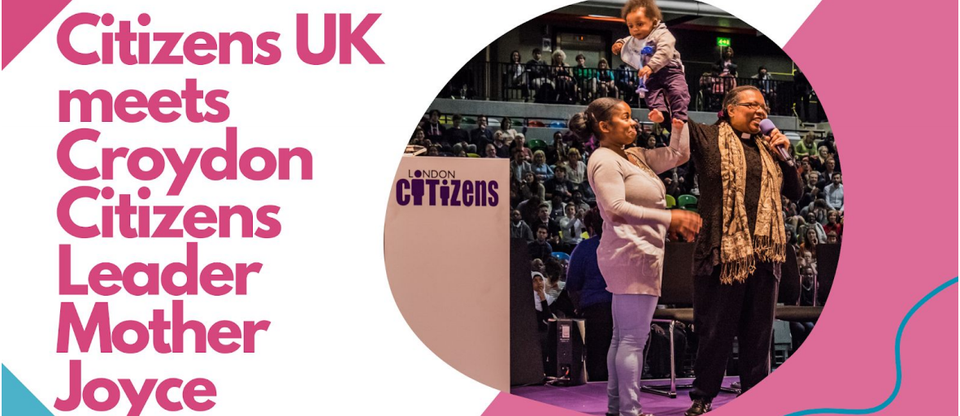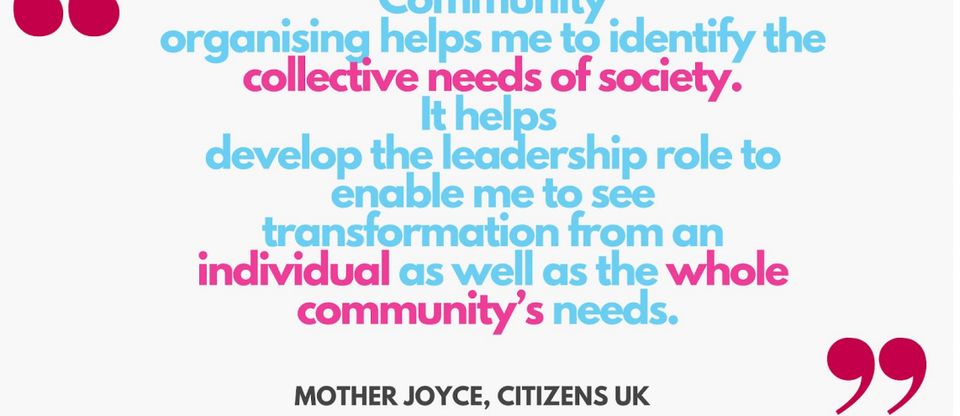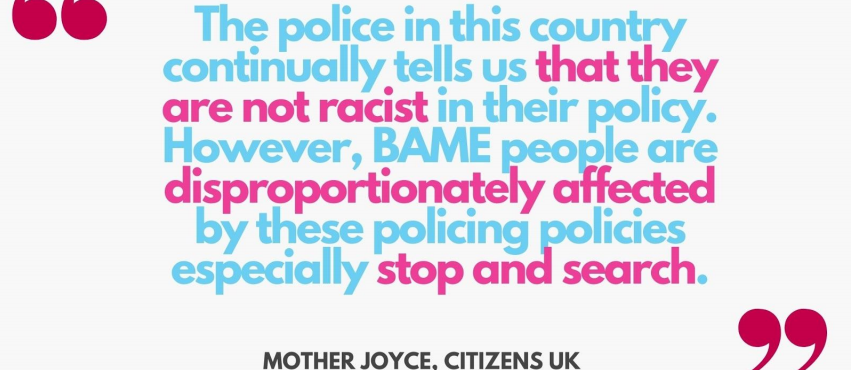Community Organising and me: an interview with Mother Joyce
Community Organising and me: an interview with Mother Joyce
We interview Croydon Citizens co-chair Mother Joyce, a veteran leader with South London Citizens about why community organising matters to her and her community.
Community organising has enabled me in my role as a priest to carry out the First Commandment to love thy neighbour as thyself
Whether it is listening one to one or relationship building, it has equipped me with a valuable set of skills. Community organising helps me to identify the collective need of the society and where my community sits within it.

What has your experience been like as a Black female clergy?
I have found that I am respected, my views have been valued and I have enjoyed a number of opportunities to take on roles in the church.
In 2014 I was made a Honorary Canon of Southwark Cathedral. In 2019 I was chosen as one of 12 Women Priests in Southwark to represent the Diocese of Southwark in an exhibition Celebrating 25 years of Women Ordination.
One experience that stands out is the first year, that together with other members of my Church, I was able to put on our celebration of Black History Month (BHM), we had been very ambitious and had used every Sunday to put an event on in Church, where members from the congregation were able to tell their stories in ways that they hadn't been able to do before, because those opportunities were not there for them. This experience brings me an enormous sense of joy especially since this is a format that many of the other Churches have picked upon as a way of celebrating Black History Month in their Churches.

What inspired you to get involved in community organising?
In my early life, I was always prompted to seek justice for the people around me. I always found myself at the centre of some form of organising, for example being a shop steward as a nursery worker.
Whilst at college I became the class rep - I wouldn't have labelled that community organising, but it was organising to get justice for the workers and see fair pay. However, when I retired from my full time employment as a social worker, I was already an ordained priest and a message went round that Croydon North Deanery had joined Citizens UK and there was an opportunity to become more involved in Community Or ganising. The training that Citizens UK offered to help me understand what Community Organising was about and help to develop my leadership skills.
The global #BlackLivesMatter movements that have emerged in response to police violence has drawn public attention to white supremacy and racism. How do you think community organising can be used to tackle racism?
Yes, I believe that community organising can be used to tackle big systemic issues like racism and oppression, in the same way it can with issues from low pay to treatment of refugees.
We have to identify what we can win, one piece at a time and make specific the issues we want the government to address - so for example Citizens may pick up the issues in education around the lack of Black History in the Curriculum, the other area is health, why have so many Black and Minority Ethnic people died, during this pandemic? Is it racism and oppression, which can be one and the same.

The police in this country continually tells us that they are not racist in their policy, however BAME people are disproportionately affected by these policing policies especially around stop and search.
But we can find positive solutions. The young people from my church, St Stephen's, and other churches in Croydon North Deanery ran a listening campaign in 2019 and this problem came up. The group, known as Public Spirit, identified a particular issue of the way police treat them as black teenagers, and they came up with a positive proposal for Stop and Relate instead. They launched their campaign at an assembly with MP Steve Reed and local police leadership, and everyone committed to exploring this with them. They're now working on turning that commitment into practice. It's a great example of using community organising to break down and tackle a big problem — like systemic racism — by taking on a tangible and winnable issue.
I see organising as the most positive way of supporting, encouraging and developing leadership in the next generation, to empower them to take the lead and not allowing their voices to be silenced and oppressed.
I want to end with the quote I always use at our Croydon Citizens assemblies, from a great inspiration to me Revd Dr Martin Luther King Jr. ‘The arc of the moral universe is long, but it bends towards justice’.




